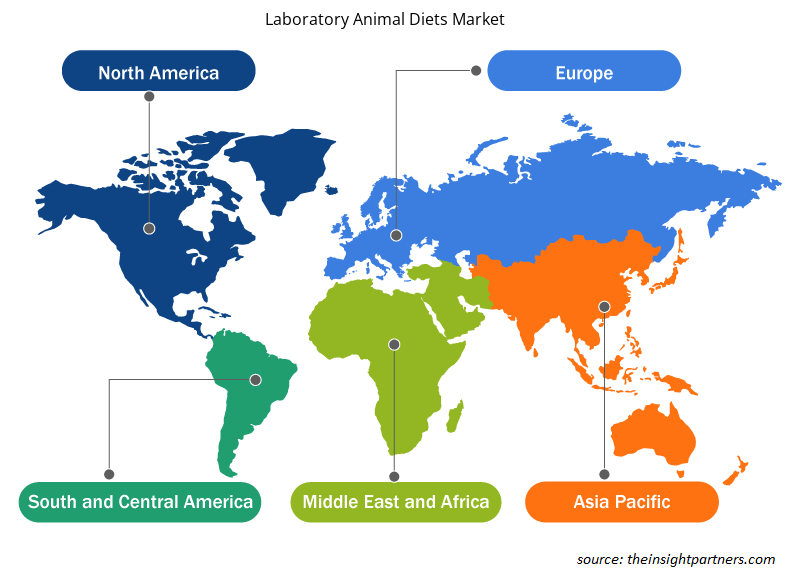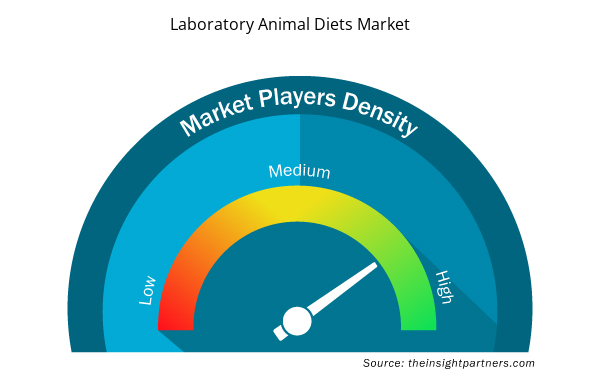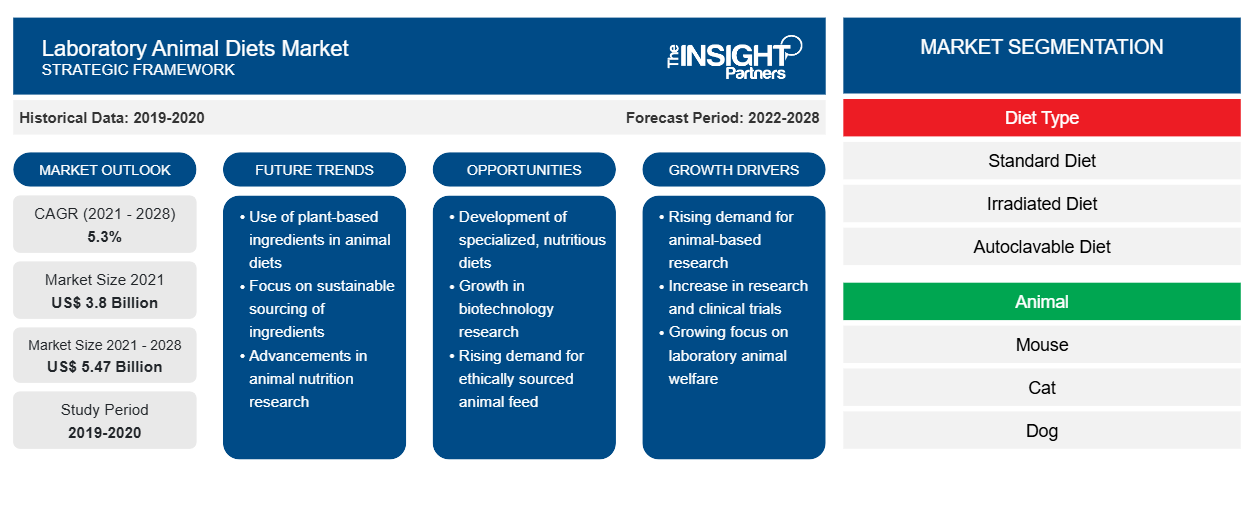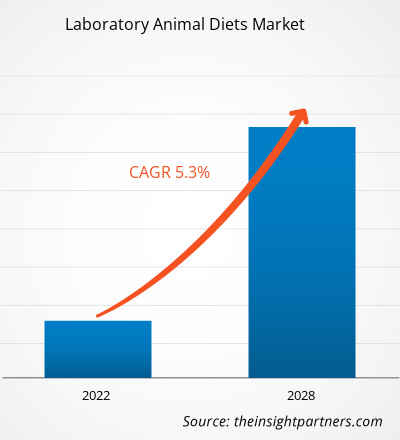实验室动物饮食市场预计将从 2021 年的 37.975 亿美元增长到 2028 年的 54.6924 亿美元;预计 2022 年至 2028 年的复合年增长率为 5.3%。
个性化医疗消费的不断增长是推动实验动物饮食市场增长的主要因素之一 。然而,实验动物饮食的高成本制约了整体市场的增长。
美国食品药品管理局 (FDA) 表示,个性化医疗旨在通过更有效地预防和治疗来增加患者获益并降低风险。个性化医疗的实际应用在很大程度上取决于是否有严格的诊断工具,以便选择最佳的治疗产品来改善患者的治疗效果。
个性化医疗是基于环境、患者独特的生物构成和生活方式的治疗。各公司专注于为各种类型的癌症引入新的伴随诊断。例如,2020 年 10 月,罗氏公司获得美国 FDA 批准,将 Cobas EGFR 突变检测 v2 扩大为治疗非小细胞肺癌 (NSCLC) 的 (CDx)。因此,FDA 批准这种新的创新方法可能为个性化医疗的患者识别铺平道路。
定制此报告以满足您的需求
您可以免费定制任何报告,包括本报告的部分内容、国家级分析、Excel 数据包,以及为初创企业和大学提供优惠和折扣
- 获取此报告的关键市场趋势。这个免费样品将包括数据分析,从市场趋势到估计和预测。
个性化医疗是一种概念、实践或模式,它基于种内差异明确预测人类对药物和疾病的反应。基因组成的细微差异可能会导致对药物或疾病的反应产生巨大差异。研究人员帮助开发针对许多遗传疾病的个性化医疗方法。这些个性化医疗有时使用定制的基因干预措施,例如反义介导的外显子跳跃或基因组编辑,以突变特异性方式恢复蛋白质功能。在药物发现和开发中,小鼠模型通过表征疾病病理生理学和相关损伤机制、确定药物靶点以及评估新疗法的毒性/安全性、药代动力学、药效学和疗效,发挥了重要作用。选择特定模型来测试和开发特定药物取决于深入研究的目标。
在药物研发中,动物模型的传统用途是建立并证明特定药物分子的安全性、有效性和目标的非临床概念验证。动物模型可以促进个性化医疗方法的发展。个性化医疗方法需要在包含人类靶序列的相关细胞和小鼠模型中进行开发和临床前测试。用于个性化医疗研究和药物发现与开发的动物模型需要特定的饮食,以便动物模型根据人类环境做出反应。因此,个性化医疗需求的不断增长预计将推动 2022-2028 年实验室动物饮食市场的增长。
区域概况
中国在亚太实验动物饲料市场占有相当大的份额。中国拥有大量的猴子和其他物种。因此,与欧洲和美国相比,中国的科学家面临的公众监督较少。中国已成为 CRISPR 动物王国的中心,这对研究人员很有吸引力。此外,中国政府对新服务和确定的研究项目进行了大规模投资。中国的动物研究根据国家和省级法律、法规、指导方针和标准进行监管和行政管理。由于政府和社会力量的推动,中国的实验动物科学在过去 30 年里发展迅速,鼓励了该国的研究项目。根据实验动物科学研究所 (ILAS) 的数据,中国每年在研究中使用大约 2000 万只动物,例如老鼠、狗、兔子和非人类灵长类动物。因此,在预测期内,利用实验动物进行的生物医学研究的增加预计将推动实验动物饲料市场的发展。
饮食类型洞察
根据饮食类型,实验室动物饮食市场分为标准饮食、辐照饮食和高压灭菌饮食。标准饮食部分在 2021 年占据了最大的市场份额。标准饮食的配方旨在满足喂养实验室动物的所有生命阶段的广泛目标,即实验室动物通常所需的营养素已经存在于标准饮食中。例如,LabDiet 犬类饮食满足实验室使用的所有犬类物种的营养需求,并支持所有生命阶段,例如生长、维持、妊娠和哺乳。此外,阿拉巴马大学伯明翰分校于 2022 年发表了一份报告,指出保持动物健康对于研究目的至关重要,良好的营养是健康的关键组成部分。由已知成分组成的标准饮食可用于啮齿动物。然而,对于某些实验室物种,营养完整(或充足)的饮食在市场上是买不到的。因此,顶级公司正在开发标准动物喂养。例如,Envigo 的标准饮食包括相对不明确的农产品,如谷物、谷物副产品、浓缩植物蛋白源、动物蛋白、维生素、矿物质和脂肪。因此,上述因素加速了标准饮食的采用,最终推动了整个实验室动物饮食市场的增长。
在实验室动物饮食市场运营的公司采用产品创新战略来满足世界各地不断变化的客户需求,这也使他们能够在市场上保持自己的品牌名称。
实验室动物饲料市场区域洞察
Insight Partners 的分析师已详细解释了预测期内影响实验室动物饮食市场的区域趋势和因素。本节还讨论了北美、欧洲、亚太地区、中东和非洲以及南美和中美洲的实验室动物饮食市场细分和地理位置。

- 获取实验室动物饮食市场的区域特定数据
实验动物饮食市场报告范围
| 报告属性 | 细节 |
|---|---|
| 2021 年市场规模 | 38亿美元 |
| 2028 年市场规模 | 54.7 亿美元 |
| 全球复合年增长率(2021 - 2028) | 5.3% |
| 史料 | 2019-2020 |
| 预测期 | 2022-2028 |
| 涵盖的领域 | 按饮食类型
|
| 覆盖地区和国家 | 北美
|
| 市场领导者和主要公司简介 |
|
实验室动物饮食市场参与者密度:了解其对业务动态的影响
实验室动物饮食市场正在快速增长,这得益于最终用户需求的不断增长,这些需求源于消费者偏好的不断变化、技术进步以及对产品优势的认识不断提高等因素。随着需求的增加,企业正在扩大其产品范围,进行创新以满足消费者的需求,并利用新兴趋势,从而进一步推动市场增长。
市场参与者密度是指在特定市场或行业内运营的企业或公司的分布情况。它表明在给定市场空间中,相对于其规模或总市场价值,有多少竞争对手(市场参与者)存在。
在实验室动物饮食市场运营的主要公司有:
- 环境
- 阿尔特罗明 Spezialfutter GmbH & Co. KG
- 实验室饮食
- 安全的
- Dyets 公司
免责声明:上面列出的公司没有按照任何特定顺序排列。

- 获取实验室动物饮食市场顶级关键参与者概述
实验室动物饮食市场——细分
- 根据动物,实验室动物饮食市场分为小鼠、猫、狗、兔子、鸡等。小鼠部分在 2021 年占据了最大的市场份额,预计在预测期内将实现最高的复合年增长率。
- 根据应用,实验室动物饮食市场细分为药物发现和个性化医疗、再生医学、传染病病理学、药物毒性和功效测试等。药物发现和个性化医疗领域在 2021 年占据了最大的市场份额。然而,预计传染病病理学领域在预测期内的复合年增长率最高。
- 根据最终用户,实验室动物饮食市场分为制药和生物制药公司、研究和学术机构和其他。制药和生物制药公司部门在 2021 年占据了最大的市场份额。然而,预计研究和学术机构部门在预测期内的复合年增长率最高。
- 根据地理位置,实验室动物饮食市场分为北美(美国、加拿大和墨西哥)、欧洲(英国、德国、法国、意大利、西班牙和欧洲其他地区)、亚太地区(中国、日本、印度、澳大利亚、韩国和亚太其他地区)、中东和非洲(阿联酋、沙特阿拉伯、南非和中东和非洲其他地区)以及南美洲和中美洲(巴西、阿根廷和南美洲和中美洲其他地区)。
- 历史分析(2 年)、基准年、预测(7 年)及复合年增长率
- PEST 和 SWOT 分析
- 市场规模价值/数量 - 全球、区域、国家
- 行业和竞争格局
- Excel 数据集



Report Coverage
Revenue forecast, Company Analysis, Industry landscape, Growth factors, and Trends

Segment Covered
This text is related
to segments covered.

Regional Scope
North America, Europe, Asia Pacific, Middle East & Africa, South & Central America

Country Scope
This text is related
to country scope.
常见问题
Growing consumption of personalized medicines and rising usage of mice models in virology & infectious disease are the most significant factors responsible for the overall market growth.
Based on diet type, the standard diets segment took the forefront leaders in the worldwide market by accounting largest share in 2021. However, irradiated diets segment is expected to witness the highest CAGR during the forecast period.
Laboratory animal diet is the science of feed preparation and feeding and is recognized as an important variable. Poor feeding decreases productivity of the animal as feed is financially the single most important element of animal production irrespective of species and production system. For example, feed cost accounts for up to 70% of the total cost of production of an animal product.
The pharmaceutical & biopharmaceutical companies segment dominated the global laboratory animal diets market and accounted for the largest market share of 58.8% in 2021.
Based on the animal, mouse segment took the forefront leaders in the worldwide market by accounting largest share in 2021 and the same segment accounts for maximum CAGR during the forecast period of 2022-2028.
Envigo, Altromin Spezialfutter GmbH & Co. KG, LabDiet, SAFE, Dyets, Inc., Special Diet Services, Specialty Feeds, Research Diets Inc., Bio-Serv, Krishna Valley Agrotech LLP are among the leading companies operating in the laboratory animal diets market.
Global laboratory animal diets market is segmented by region into North America, Europe, Asia Pacific, the Middle East & Africa, and South & Central America. In North America, the U.S. held the largest market share in 2021.
Trends and growth analysis reports related to Life Sciences : READ MORE..
The List of Companies - Laboratory Animal Diets Market
- Envigo
- Altromin Spezialfutter GmbH & Co. KG
- LabDiet
- SAFE
- Dyets, Inc.
- Special Diet Services
- Specialty Feeds
- Research Diets Inc.
- Bio-Serv
- Krishna Valley Agrotech LLP
The Insight Partners performs research in 4 major stages: Data Collection & Secondary Research, Primary Research, Data Analysis and Data Triangulation & Final Review.
- Data Collection and Secondary Research:
As a market research and consulting firm operating from a decade, we have published and advised several client across the globe. First step for any study will start with an assessment of currently available data and insights from existing reports. Further, historical and current market information is collected from Investor Presentations, Annual Reports, SEC Filings, etc., and other information related to company’s performance and market positioning are gathered from Paid Databases (Factiva, Hoovers, and Reuters) and various other publications available in public domain.
Several associations trade associates, technical forums, institutes, societies and organization are accessed to gain technical as well as market related insights through their publications such as research papers, blogs and press releases related to the studies are referred to get cues about the market. Further, white papers, journals, magazines, and other news articles published in last 3 years are scrutinized and analyzed to understand the current market trends.
- Primary Research:
The primarily interview analysis comprise of data obtained from industry participants interview and answers to survey questions gathered by in-house primary team.
For primary research, interviews are conducted with industry experts/CEOs/Marketing Managers/VPs/Subject Matter Experts from both demand and supply side to get a 360-degree view of the market. The primary team conducts several interviews based on the complexity of the markets to understand the various market trends and dynamics which makes research more credible and precise.
A typical research interview fulfils the following functions:
- Provides first-hand information on the market size, market trends, growth trends, competitive landscape, and outlook
- Validates and strengthens in-house secondary research findings
- Develops the analysis team’s expertise and market understanding
Primary research involves email interactions and telephone interviews for each market, category, segment, and sub-segment across geographies. The participants who typically take part in such a process include, but are not limited to:
- Industry participants: VPs, business development managers, market intelligence managers and national sales managers
- Outside experts: Valuation experts, research analysts and key opinion leaders specializing in the electronics and semiconductor industry.
Below is the breakup of our primary respondents by company, designation, and region:

Once we receive the confirmation from primary research sources or primary respondents, we finalize the base year market estimation and forecast the data as per the macroeconomic and microeconomic factors assessed during data collection.
- Data Analysis:
Once data is validated through both secondary as well as primary respondents, we finalize the market estimations by hypothesis formulation and factor analysis at regional and country level.
- Macro-Economic Factor Analysis:
We analyse macroeconomic indicators such the gross domestic product (GDP), increase in the demand for goods and services across industries, technological advancement, regional economic growth, governmental policies, the influence of COVID-19, PEST analysis, and other aspects. This analysis aids in setting benchmarks for various nations/regions and approximating market splits. Additionally, the general trend of the aforementioned components aid in determining the market's development possibilities.
- Country Level Data:
Various factors that are especially aligned to the country are taken into account to determine the market size for a certain area and country, including the presence of vendors, such as headquarters and offices, the country's GDP, demand patterns, and industry growth. To comprehend the market dynamics for the nation, a number of growth variables, inhibitors, application areas, and current market trends are researched. The aforementioned elements aid in determining the country's overall market's growth potential.
- Company Profile:
The “Table of Contents” is formulated by listing and analyzing more than 25 - 30 companies operating in the market ecosystem across geographies. However, we profile only 10 companies as a standard practice in our syndicate reports. These 10 companies comprise leading, emerging, and regional players. Nonetheless, our analysis is not restricted to the 10 listed companies, we also analyze other companies present in the market to develop a holistic view and understand the prevailing trends. The “Company Profiles” section in the report covers key facts, business description, products & services, financial information, SWOT analysis, and key developments. The financial information presented is extracted from the annual reports and official documents of the publicly listed companies. Upon collecting the information for the sections of respective companies, we verify them via various primary sources and then compile the data in respective company profiles. The company level information helps us in deriving the base number as well as in forecasting the market size.
- Developing Base Number:
Aggregation of sales statistics (2020-2022) and macro-economic factor, and other secondary and primary research insights are utilized to arrive at base number and related market shares for 2022. The data gaps are identified in this step and relevant market data is analyzed, collected from paid primary interviews or databases. On finalizing the base year market size, forecasts are developed on the basis of macro-economic, industry and market growth factors and company level analysis.
- Data Triangulation and Final Review:
The market findings and base year market size calculations are validated from supply as well as demand side. Demand side validations are based on macro-economic factor analysis and benchmarks for respective regions and countries. In case of supply side validations, revenues of major companies are estimated (in case not available) based on industry benchmark, approximate number of employees, product portfolio, and primary interviews revenues are gathered. Further revenue from target product/service segment is assessed to avoid overshooting of market statistics. In case of heavy deviations between supply and demand side values, all thes steps are repeated to achieve synchronization.
We follow an iterative model, wherein we share our research findings with Subject Matter Experts (SME’s) and Key Opinion Leaders (KOLs) until consensus view of the market is not formulated – this model negates any drastic deviation in the opinions of experts. Only validated and universally acceptable research findings are quoted in our reports.
We have important check points that we use to validate our research findings – which we call – data triangulation, where we validate the information, we generate from secondary sources with primary interviews and then we re-validate with our internal data bases and Subject matter experts. This comprehensive model enables us to deliver high quality, reliable data in shortest possible time.


 获取此报告的免费样本
获取此报告的免费样本